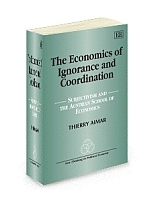|
||
• wydawnictwa polskie
• Zamów informacje o nowościach z wybranego tematu • kontakt
• Cookies na stronie |
THE ECONOMICS OF IGNORANCE AND COORDINATION SUBJECTIVISMAIMAR TH. / AND THE AUSTRIAN SCHOOL OF ECONOMICS /wydawnictwo: EDWARS ELGAR , rok wydania 2009, wydanie Icena netto: This book clarifies the specific nature of the Austrian theory and restores the unity and open-mindedness of the Austrian school in general. The intention is not to offer a collection of different or parallel ideas, but
rather to retrace, from a pedagogical and constructive perspective, the various stages of
the construction of a well-founded theoretical edifice: from Ludwig von Mises to Murray
Rothbard, from Friedrich Hayek to Israel M. Kirzner and from Lachmann to Lavoie. The book
is a reconstitution of the way Austrian ideas and concepts organize themselves in a common
structure. Thierry Aimar, Assistant Professor of Economics, Sciences Po Paris, University of Nancy 2, the Paris 1 Panthéon-Sorbonne and ESSEC Business School Paris, France Table of Contents 280 pages, Hardcover Księgarnia nie działa. Nie odpowiadamy na pytania i nie realizujemy zamówien. Do odwolania !. |


